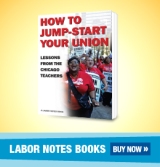by Derek Blackadder
The big Canadian story so far this year is the decision by Unifor, the country’s largest private sector union, to leave the Canadian Labour Congress or CLC, the national labour centre. The decision has sent shockwaves through all unions and it threatens not just national programmes but co-ordination between unions at the regional and local levels.
Splits in national labour movements are far from unknown. In some countries longstanding ideological differences have meant that multiple national labour bodies are the norm as with Poland or India. In the USA and South Africa splits over fundamental political or programmatic positions are more recent. Other than a few years in the 1990s when the building trades unions formed the Canadian Federation of Labour, the Canadian movement has been united since 1956 when two rival centres merged.
Unifor is the product of a series of mergers between unions dating back decades. Most of the predecessor unions were the result of splits from an American parent union. In the private sector most unions were and many still are sections of unions based in the USA. The largest of Unifor’s predecessor unions, the Canadian Autoworkers or CAW, was formed when Canadian workers resisted the concessions that had been agreed-to by the UAW in bargaining with the large American car makers on both sides of the border. Nationalism and a commitment to the creation of Canadian unions runs deep in Unifor culture.
Moves by Unifor to assist leaders of large local unions in taking their members out of US-based unions created considerable conflict within the leadership of the CLC. Unifor sees its actions as supporting the right of workers to freely choose their union. Opponents point to the CLC’s existing process by which unhappy workers can move from one union to another and attribute Unifor’s frustration to its inability to make gains in membership using that process.
Union activists are deeply worried that fighting over already organized workers will waste resources and serves as a distraction from the movement’s real task: organizing the unorganized.
On 16 January Unifor’s executive made the decision to leave the CLC, promising not to damage solidarity at the local level where unions co-ordinate national mass campaigns. Several of these are under way at the moment and were, until recently, considered great successes, including one in support of coffee shop workers (see HERE for more).
Unifor explains its reasons for leaving the CLC HERE.
Within hours of the announcement Unifor, in concert with hotel union dissidents, began raiding workers who are currently members of UNITE-HERE, a US-based union. At this point the Unifor campaign is having considerable success.
Leadership reaction to the split varies by union. They range from attacks on Unifor to appeals for unification talks. Activists across the country are expressing concern about Unifor’s motives and goals. Cross-union caucuses and local Labour Councils (where activists from different unions co-ordinate local activities) are working to ensure effective solidarity despite the split. See HERE for an example of the rank-and-file reaction and HERE for the reaction of the President of the Toronto Labour Council, the country’s largest.
The Canadian sections of what in North America are called international unions are turning inward and focusing on preparing their members for an approach by Unifor, on defending from a loss in membership. Canada-only unions, referred-to as national unions, appear to be largely unconcerned about direct confrontations with Unifor. Local Labour Councils and provincial Federations of Labour are working to minimize the impact, sometimes not knowing if the Unifor members elected to lead them are still eligible to do so.
LabourStart Canada will continue to follow this story as it develops and you can too by visiting the LabourStart Canadian news page or by following our Twitter feeds in both of Canada’s official languages: @LabourStartCanE for stories in English and @LabourStartCanF for stories in French.
This special report is reposted from LabourStart. Look for the LabourStart table at the upcoming Labor Notes Conference in Chicago.
Filed under: Global organizing, Uncategorized | Tagged: Canada, CLC, Unifor, UniteHere |





[…] The Canadian labour world continues their struggle to find hope and solidarity in the wake of Unifor’s decision to leave the Canadian Labour Congress. Click here for the update. […]
[…] The Canadian labour world continues their struggle to find hope and solidarity in the wake of Unifor’s decision to leave the Canadian Labour Congress. Click here for the update. […]